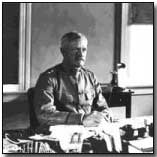Primary Documents - General John J Pershing's Special Order of the Day, 27 August 1918
 The
Second Battle of the Marne -
which ran from 15 July to 4 August 1918 - was intended as Germany's final
major attempt at breakthrough on the Western Front prior to the arrival of
ever-increasing U.S. troops on the battlefield.
The
Second Battle of the Marne -
which ran from 15 July to 4 August 1918 - was intended as Germany's final
major attempt at breakthrough on the Western Front prior to the arrival of
ever-increasing U.S. troops on the battlefield.
In the event the battle proved a significant Allied victory. Once it became clear that the Germans had not only failed in their aim to win the war in the offensive, but had in fact lost ground, a number of German commanders, including Crown Prince Wilhelm, believed the war was lost.
Reproduced below is the text of U.S. Commander-in-Chief John J Pershing's Special Order of the Day, dated 27 August 1918, in which he praised the role of his forces in the aftermath of the battle.
Click here to read General Gouraud's appeal to his forces at the onset of the battle. Click here to read an extract from U.S. Commander-in-Chief Pershing's official report summarising U.S. participation in the battle. Click here and here to read semi-official German press statements published in July and August 1918 on the outcome of fighting at the Marne. Click here to read a German memoir focusing on the events of 15 July. Click here and here to read contrasting statements regarding the effectiveness of the Allied counterattacks, issued by chief German strategist Erich Ludendorff. Click here to read the official address given by French General Charles Mangin on 7 August 1915, directed to U.S. First and Second servicemen who, assisting Mangin's French Tenth Army, participated in the Allied counter-attacks launched on 18 August. Click here to read the view later given by Mangin concerning the turning point of the Allied counterattack at the Marne. Click here to read the official address given by French Sixth Army General Jean Degoutte to French and U.S. troops towards the close of the battle, on 9 August 1918, in which he praised the conduct of American forces. Click here to read an account by Karl Rosner of how news of the battle was received by the Kaiser.
General John J Pershing's Order of the Day to U.S. Forces, 27 August 1918
It fills me with pride to record in general orders a tribute to the service achievements of the 1st and 3rd Corps, comprising the 1st, 2nd, 3rd, 4th, 26th, 28th, 32nd, and 42nd Divisions of the American Expeditionary Forces.
You came to the battlefield at a crucial hour for the Allied cause. For almost four years the most formidable army the world has yet seen had pressed its invasion of France and stood threatening its capital.
At no time has that army been more powerful and menacing than when, on July 15th, it struck again to destroy in one great battle the brave men opposed to it and to enforce its brutal will upon the world and civilization.
Three days later, in conjunction with our allies, you counter-attacked. The Allied armies gained a brilliant victory that marks the turning point of the war. You did more than to give the Allies the support to which, as a nation, our faith was pledged. You proved that our altruism, our pacific spirit, and our sense of justice have not blunted our virility or our courage.
You have shown that American initiative and energy are as fit for the tasks of war as for the pursuits of peace.
You have justly won unstinted praise from our allies and the eternal gratitude of our countrymen.
We have paid for our success with the lives of many of our brave comrades. We shall cherish their memory always and claim for our history and literature their bravery, achievement, and sacrifice.
This order will be read to all organizations at the first assembly formations following its receipt.
PERSHING
Source: Source Records of the Great War, Vol. VI, ed. Charles F. Horne, National Alumni 1923
Flak was a term used to describe anti-aircraft fire.
- Did you know?
